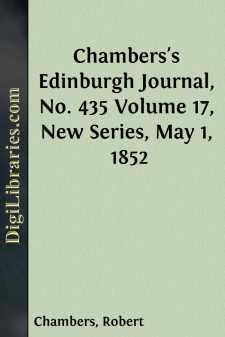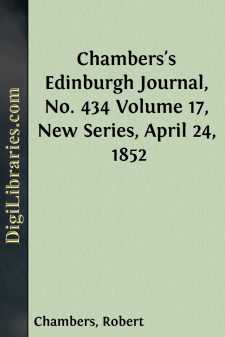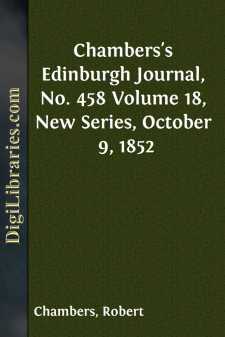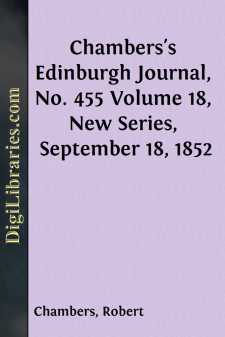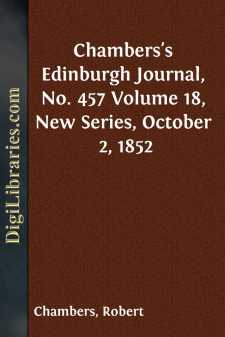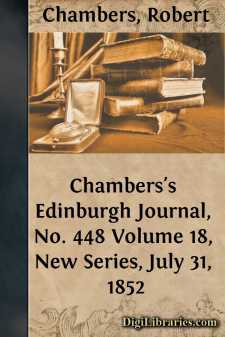Categories
- Antiques & Collectibles 13
- Architecture 36
- Art 48
- Bibles 22
- Biography & Autobiography 813
- Body, Mind & Spirit 142
- Business & Economics 28
- Children's Books 17
- Children's Fiction 14
- Computers 4
- Cooking 94
- Crafts & Hobbies 4
- Drama 346
- Education 46
- Family & Relationships 57
- Fiction 11829
- Games 19
- Gardening 17
- Health & Fitness 34
- History 1377
- House & Home 1
- Humor 147
- Juvenile Fiction 1873
- Juvenile Nonfiction 202
- Language Arts & Disciplines 88
- Law 16
- Literary Collections 686
- Literary Criticism 179
- Mathematics 13
- Medical 41
- Music 40
- Nature 179
- Non-Classifiable 1768
- Performing Arts 7
- Periodicals 1453
- Philosophy 64
- Photography 2
- Poetry 896
- Political Science 203
- Psychology 42
- Reference 154
- Religion 513
- Science 126
- Self-Help 84
- Social Science 81
- Sports & Recreation 34
- Study Aids 3
- Technology & Engineering 59
- Transportation 23
- Travel 463
- True Crime 29
Chambers's Edinburgh Journal, No. 437 Volume 17, New Series, May 15, 1852
by: Robert Chambers
Description:
Excerpt
There is no occupation in life, be it ever so humble, which is justly worthy of contempt, if by it a man is enabled to administer to his necessities without becoming a burden to others, or a plague to them by the parade of shoeless feet, fluttering rags, and a famished face. In the multitudinous drama of life, which on the wide theatre of the metropolis is ever enacting with so much intense earnestness, there is, and from the very nature of things there always must be, a numerous class of supernumeraries, who from time to time, by the force of varying circumstances, are pushed and hustled off the stage, and shuffled into the side-scenes, the drear and dusky background of the world's proscenium. Of the thousands and tens of thousands thus rudely dealt with, he is surely not the worst who, wanting a better weapon, shoulders a birch-broom, and goes forth to make his own way in the world, by removing the moist impediments of filth and refuse from the way of his more fortunate fellows. Indeed, look upon him in what light you may, he is in some sort a practical moralist. Though far remote from the ivy chaplet on Wisdom's glorious brow, yet his stump of withered birch inculcates a lesson of virtue, by reminding us, that we should take heed to our steps in our journeyings through the wilderness of life; and, so far as in him lies, he helps us to do so, and by the exercise of a very catholic faith, looks for his reward to the value he supposes us to entertain for that virtue which, from time immemorial, has been in popular parlance classed as next to godliness.
Time was, it is said, when the profession of a street-sweeper in London was a certain road to competence and fortune—when the men of the brooms were men of capital; when they lived well, and died rich, and left legacies behind them to their regular patrons. These palmy days, at any rate, are past now. Let no man, or woman either, expect a legacy at this time of day from the receiver of his copper dole. The labour of the modern sweeper is nothing compared with his of half a century ago. The channel of viscous mud, a foot deep, through which, so late as the time when George the Third was king, the carts and carriages had literally to plough their way, no longer exists, and the labour of the sweeper is reduced to a tithe of what it was. He has no longer to dig a trench in the morning, and wall up the sides of his fosse with stiff earth, hoarded for the purpose, as we have seen him doing in the days when 'Boney' was a terror. The city scavengers have reduced his work to a minimum, and his pay has dwindled proportionately. The twopences which used to be thrown to a sweeper will now pay for a ride, and the smallest coin is considered a sufficient guerdon for a service so light. But what he has lost in substantial emolument, he has gained in morale; he is infinitely more polite and attentive than he was; he sweeps ten times as clean for a half-penny as he did for twopence or sixpence, and thanks you more heartily than was his wont in the days of yore. The truth is, that civility, as a speculation, is found to pay; and the want of it, even among the very lowest rank of industrials in London, is at the present moment not merely a rarity, but an actual phenomenon—always supposing that something is to be got by it.
The increase of vehicles of all descriptions, but more especially omnibuses, which are perpetually rushing along the main thoroughfares, has operated largely in shutting out the crossing-sweepers from what was at one period the principal theatre of their industry. Independent, too, of the unbroken stream of carriages which renders sweeping during the day impossible, and the collection of small coin from the crowd who dart impatiently across the road when a practicable breach presents itself, equally so, it is found that too dense a population is less favourable to the brotherhood of the broom than one ever so sparse and thin. Had the negro of Waithman's obelisk survived the advent of Shillibeer, he would have had to shift his quarters, or to have drawn upon his three-and-a-half per cents. to maintain his position. The sweepers who work on the great lines of traffic from Oxford Street west to Aldgate, are consequently not nearly so numerous as they once were, though the members of the profession have probably doubled their numbers within the last twenty years. They exercise considerable judgment in the choice of their locations, making frequent experiments in different spots, feeling the pulse of the neighbourhood, as it were, ere they finally settle down to establish a permanent connection....




